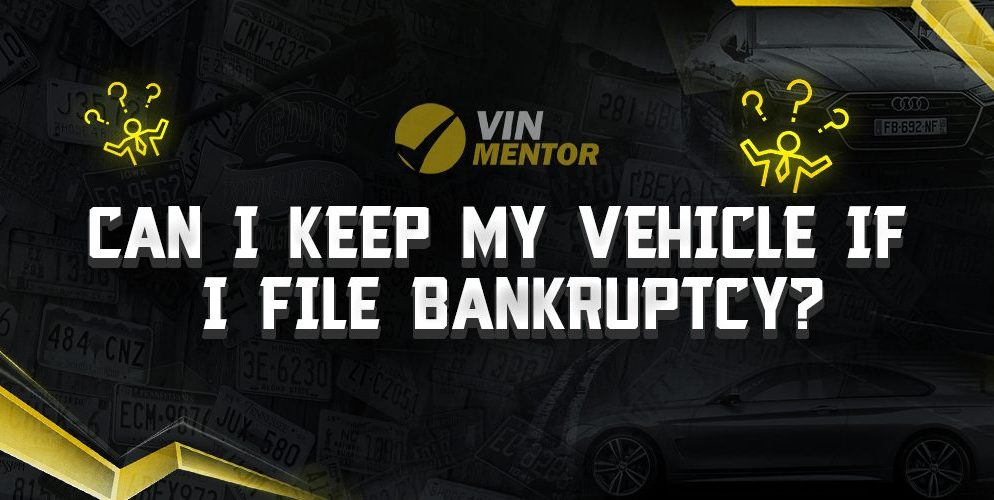

Filing for bankruptcy can be a complex and overwhelming process, and one of the common concerns individuals have been whether they can keep their vehicles. The impact of bankruptcy on vehicle ownership depends on several factors, including the type of bankruptcy filed, the equity in the vehicle, and applicable state laws. In this article, we will explore the considerations surrounding vehicle ownership during bankruptcy. Read on to understand the implications and possibilities.
Key Takeaways
- Filing for bankruptcy does not automatically mean you will lose your vehicle.
- The outcome regarding vehicle retention varies depending on the type of bankruptcy and equity in the vehicle.
- Certain bankruptcy exemptions and state laws may allow you to retain your vehicle.
- Consultation with a bankruptcy attorney is crucial to navigate the process and understand your specific circumstances.
Is it Possible to Retain Ownership of My Vehicle if I File for Bankruptcy?
Bankruptcy can be a complex and overwhelming process, and one concern many individuals have is whether they can keep their vehicle. The answer to this question depends on the type of bankruptcy filing and various factors, including equity, exemptions, repayment plans, and state laws. Let’s explore the possibilities and considerations when it comes to retaining your vehicle in Chapter 7 and Chapter 13 bankruptcy.
Chapter 7 Bankruptcy
Chapter 7 bankruptcy involves the liquidation of assets to repay creditors. However, specific exemptions exist to protect essential property, such as vehicles. Consider the following:
- Equity: If you have substantial equity in your vehicle, it may be at risk of being sold to repay creditors. The allowable equity limit varies by state, so understanding your state’s laws is crucial.
- Exemptions: Many states provide exemptions that allow you to protect a certain amount of equity in your vehicle. Consult with a bankruptcy attorney to determine if you can use exemptions to retain your vehicle.
Chapter 13 Bankruptcy
Chapter 13 bankruptcy involves creating a repayment plan to settle debts over a specified period. Vehicle retention in Chapter 13 bankruptcy depends on the following factors:
- Repayment Plan: In Chapter 13, you may be able to keep your vehicle by including it in the repayment plan. This allows you to catch up on missed payments and retain ownership.
- Equity and Value: The equity and value of the vehicle will influence how it is treated in the repayment plan. If the vehicle’s value exceeds the allowable exemption, you may need to repay the excess amount.
State Laws and Exemptions
Each state has specific laws and exemptions regarding vehicle ownership during bankruptcy. These laws determine the equity limits and the amount of value you can protect. Understanding your state’s exemptions is essential to assess your chances of retaining your vehicle.
Consultation with a Bankruptcy Attorney
Navigating the bankruptcy process can be complex, and consulting with a bankruptcy attorney is highly recommended. An attorney can provide guidance based on your unique circumstances and help you understand the options available to retain your vehicle.
Conclusion
The question of whether you can keep your vehicle when filing for bankruptcy depends on various factors, including the type of bankruptcy, equity in the vehicle, and applicable state laws. While bankruptcy does not automatically result in the loss of your vehicle, understanding the implications and seeking professional guidance are crucial to protect your interests.
To gain a comprehensive understanding of your specific circumstances, consult with a bankruptcy attorney. They can provide tailored advice based on the type of bankruptcy you file, applicable exemptions, and state laws. This will help you navigate the process with clarity and make informed decisions regarding your vehicle.
FAQ
Will filing for bankruptcy automatically mean I have to give up my vehicle?
No, filing for bankruptcy does not automatically result in the loss of your vehicle. The outcome depends on various factors, including the type of bankruptcy, equity in the vehicle, applicable exemptions, and state laws.
What is the difference between Chapter 7 and Chapter 13 bankruptcy?
Chapter 7 bankruptcy involves the liquidation of assets to repay creditors, while Chapter 13 bankruptcy involves creating a repayment plan to settle debts over a specified period.
How does equity in my vehicle affect its retention during bankruptcy?
If you have substantial equity in your vehicle, it may be at risk of being sold to repay creditors. The allowable equity limit varies by state, so understanding your state’s laws is crucial.
Are there exemptions that can protect my vehicle during bankruptcy?
Many states provide exemptions that allow you to protect a certain amount of equity in your vehicle. Consult with a bankruptcy attorney to determine if you can use exemptions to retain your vehicle.
Can I include my vehicle in a repayment plan in Chapter 13 bankruptcy?
Yes, in Chapter 13 bankruptcy, you may be able to keep your vehicle by including it in the repayment plan. This allows you to catch up on missed payments and retain ownership.
How do state laws and exemptions affect vehicle ownership during bankruptcy?
Each state has specific laws and exemptions that determine the equity limits and the amount of value you can protect. Understanding your state’s exemptions is essential to assess your chances of retaining your vehicle.
Why is it important to consult with a bankruptcy attorney?
Navigating the bankruptcy process can be complex, and consulting with a bankruptcy attorney is highly recommended. An attorney can provide guidance based on your unique circumstances and help you understand the options available to retain your vehicle.












